Middle East Eye
Link
This is the story of a country - a country built on oil.
Modern Saudi Arabia has been a single resource economy since the discovery of black gold in 1938. Its successive governments have introduced 10 development plans so far, the first in 1970, the latest in 2015.
Their single strategic goal? To achieve economic diversification away from the kingdom’s over-dependence on oil.
But at least nine of those plans have failed miserably in realising that objective. The kingdom has yet to build any serious industrial infrastructure, beyond some basic petrochemical, plastic and food processing plants.
The results from the latest – and 10th - development plan, the National Transformation Plan (NTP), remain to be seen. It is a five-year vision, running from 2015 till 2020, that forms the first phase of the much bigger Vision 2030, the Saudi government's long-term diversification strategy.
Still addicted to oil
Vision 2030 states that the government will achieve its goal by selling public assets and reinvesting the funds, raising revenues through "new" channels other than oil. But this is not true: the value of those assets still derives from the oil-dependent economy.
In July 2017, the government announced plans to sell significant minority stakes (up to 49 percent) in King Khaled Airport, which reportedly handled 22.5 million passengers in 2016.
But this movement of people is only a result of economic activity, an outcome of government oil-money spending - and an artificial value based on a temporary oil-based economy. Despite government claims, it is not diversification but continued capitalisation from the same source.
 US President Barack Obama at King Khaled airport, which Saudi plans to sell, in June 2009 (AFP)
US President Barack Obama at King Khaled airport, which Saudi plans to sell, in June 2009 (AFP)
For investors, the future could be gloomy, subject as it will be to fluctuating oil prices and the government's continuous ability to finance its budget. These are not strong economic fundamentals upon which professionals would wish to base their decisions.
Riyadh also plans to sell a portion in Aramco, the world’s largest oil producer, as part of an effort “to raise $200 billion over the next several years”. It anticipates a world where green economics are increasingly the dominant force and wants to prepare Saudi for a post-fossil fuels planet.
Eventually, the kingdom aims to create the world’s largest public investment fund (PIF), estimated to be worth $2 trillion. The government wishes the fund to become the country's new oil, to reinvest that money and deliver constant profits to finance the ever-increasing consumption-based budgets.
It doesn’t have to be this way: the government needs to allow public participation to avoid political shocks
However, the decision to sell airports and, more importantly, the oil company - the country's only source of income - are major moves which will determine the fate of Saudi. As such, they should be subject to public approval and are beyond the scope of any one person, including the king or his son.
This can only be obtained through free public dialogue, followed by an open referendum. But Saudi lacks the political will and institutional capacity for this. Instead, it is an extreme environment where the government either takes all the credit or all the blame.
It doesn’t have to be this way: the government needs to allow public participation to avoid political shocks.
Does anyone know what they're doing?
A government that has always relied on the easy money of oil sales is inadequately positioned to lead the post-oil era. Riyadh lacks the cultural capacity to govern in a different world. Oil sales produce constant and rapid flows of cash, in contrast to the pro-investment approach, which is a much more daunting long-term mechanism for money creation.
The Saudi government has a track record of indiscipline when it comes to allowing investments to pay dividends. At times of booming prices, Riyadh usually invests its cash surpluses internationally. When oil plummets, they rush to liquidate their positions.
This approach fails to stand the test of time, resulting in a disastrous record of public fund investments over the decades. This is evident in the narrow contribution of those investments to the national GDP.
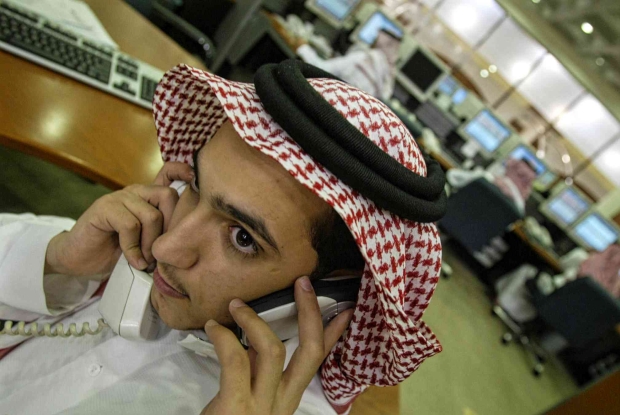 A Saudi trader takes orders in the dealing room of the Saudi Investment Bank in Riyadh (AFP)
A Saudi trader takes orders in the dealing room of the Saudi Investment Bank in Riyadh (AFP)
Furthermore, Vision 2030 states that the funds raised by selling public entities will be reinvested to produce “high returns”. But financial professionals always advise that investment schemes which promise high returns are risky, often because they are prone to high volatility or value fluctuations.
Do the Saudi government and the Saudi public know what is involved in making such decisions?
We already know from experience that the Saudi government lacks self-discipline (or what investment gurus call emotional intelligence). This is a key characteristic for a return on investment to be realised, regardless of any pressures on decision makers, as in, falling oil prices.
Who is to be held responsible for gambling with the nation’s only treasure, the Saudi oil company Aramco, in exchange for hope?
We should also ask whether Riyadh has the technical capacity to effectively and efficiently make crucial decisions as to when to exit a position and run the losses short; and when to wait for prices to rebound, if they ever do.
Who is to be held responsible for gambling with the nation’s only treasure, Aramco, in exchange for hope? Could the authorities not think of any better alternatives to raise money for the purpose of investment than the sale of Aramco or any other public companies? Why do the authorities treat Vision 2030 as an untouchable and unamendable holy Quran?
These are some of the questions the Saudi public is asking – as seen by the debate on social media - and to which the government fails to respond.
Too much power in one place
But the Saudi monarchy is a centralised system of power, which not only blocks any real attempts at debate but also at real efforts to create a diverse economy reliant on human capital.
Take the Saudi education system. In a globalised economy, there are standard skills that all education systems need to equip their graduates with. Look at Ireland: there, the Expert Group on Future Skill Needs (EGFSN) identifies a broad range of abilities that future workforces need to ensure their employability in modern economies.
 Saudi students sit their final high school exams in Jeddah in May 2015 (AFP)
Saudi students sit their final high school exams in Jeddah in May 2015 (AFP)
These are the fundamental skills needed for entry-level employment, including literacy, numeracy and basic information and communication technology; then the people-centred skills such as communication. Finally, there are the conceptual and thinking skills such as research, analysis, problem-solving, planning, critical thinking and creative abilities.
But the Saudi education system hardly delivers the most basic skills of Arab literacy and numeracy, despite its astronomical budget, which was more than $53 billion in 2017 budget.
This is a ridiculous figure, given the poor outcomes, as is evident from the widespread unemployability of its graduates. As an opinion writer for Mideast Posts reported in 2012:
“Perhaps the most insidious problem, though, is that having been educated in a narrow field, these graduates have a tendency to view the world through the lenses crafted by that field of study... They’re ‘better educated’ in that they now hold degrees, but they are worse educated in that they know less of the world, of mankind, than almost any other field of study would produce. The only jobs they are competent to fill are those artificially created by government in the Commission for the Promotion of Virtue and Prevention of Vice.”
An OECD report in 2016 found that “the percentage of today's young people expected to obtain a master's or an equivalent degree during their lifetime is one of the lowest among OECD countries and partner economies with available data” and ranked Saudi 37 out of 38 OECD members and partner countries.
The problem is not even the limited number of graduates. Mohammad I Al-Hassan, vice president for educational and academic affairs at King Saud University, asked a decade ago: “Why, if many from our staff graduated from Yale, Harvard, and Stanford, don't they make any real breakthroughs? There is no tenure system here, and we don't spend money on research, so it is just not the right environment to promote originality.”
Little has changed since.
Analytical skills are transferable by their nature and unconstrained by specialisms such as law or economics. They allow every area of social existence to be scrutinised, leading to citizens capable of thinking independently beyond state propaganda. But the Saudi ruling family fears the emergence of such citizens – and the education system is carefully designed to hinder such empowerment.
Formal education in Saudi Arabia is intended to generate specific outcomes, functioning as a mind-control operation, with its overemphasis on the teachings of unconditional obedience to the rulers
Instead, formal education in Saudi Arabia is intended to generate specific outcomes, functioning as a mind-control operation, with its overemphasis on the teachings of unconditional obedience to the rulers - fiqh ta-at wali al-amr). It is a systematic 12-year-long brainwashing methodology designed to deliberately produce incapable citizens, unable to deviate their mindsets from what they like to call “the consensus of the nation” to unconditionally obey the king.
But while “the consensus of the nation” is a myth, a large segment of Saudis still fail to see it this way for the reasons addressed here. It remains an idea, promoted through government platforms including speeches at Friday prayers and religious TV shows.
This lack of oversight and power concentration can only hinder real economic development. Think of the tech industry and the importance of constant innovation to develop new products and new markets. It's simply unachievable in the Saudi context, whose institutional deficiencies undermine any hope of a diversified economy.
Where is the money going?
One of the main causes of this government failure is lack of oversight. For instance, in 2014, Saudi Arabia announced what it called King Abdullah's Project to Reform the Public Education Sector; “a four-year plan worth more than 80 billion Saudi riyals ($21.33bn) to develop the country's education sector…”
Then Abdullah died in January 2015 and a new ruler ascended the throne. King Salman has since announced fresh strategies, which often override previous ones. But what happened to the education reform plans, one may ask, announced just one year before his inauguration? Or the massive budget dedicated to it?
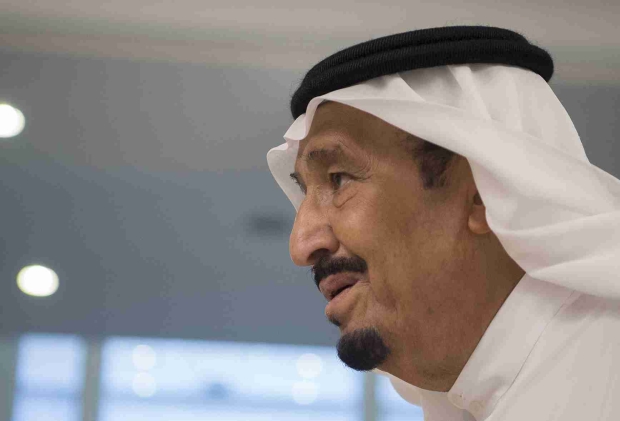 King Salman bin Abdulaziz al-Saud in Jeddah in June 2017 (AFP/Saudi Royal Palace)
King Salman bin Abdulaziz al-Saud in Jeddah in June 2017 (AFP/Saudi Royal Palace)
The project was announced by Prince Khaled al-Faisal, the then-education minister, at a press conference in 2014 - even though the project was actually being financed by billions of dollars in state budgets from 2008 till 2015.
During the conference, Faisal gave huge numbers for every segment of the project - but it is unclear how those figures were arrived at and who would monitor how the money was to be spent.
In the absence of effective and independent oversight, and in light of the official approach to silence rights advocates, it is opaque as to how contracts were awarded or how these numbers were arrived at.
One might expect answers from Faisal, who is now the governor of Makkah Province. But no one has the power to call him to account: instead he was simply given a new post, leaving questions unanswered.
The ministry of education, under his management, received tremendous funding to supposedly reform the public education system. Yet the outcomes of the project were never delivered: by appointing him as the governor of Makkah, the government effectively granted him immunity from any potential fallout.
Ministers who were part of the strategy should attend open hearings, where they can be questioned by representatives of the public, rather than appointees of the governement such as the Shura Council
One might, perhaps, look to the Saudi anti-corruption commission, Nazaha, to examine what happened. It is supposed to have financial and political independence and to only be answerable to public representatives. But it is powerless, its members appointed by the government and without any clear authority. It has no power to investigate potential suspects or cases and is ultimately meaningless without full autonomy.
Instead it deludes the public into believing that the government is somehow serious about tackling corruption. Effectively this makes the commission, as it stands, part of the problem.
There needs to have been oversight of the 2014 plan. Ministers who were part of the strategy should attend open hearings, where they can be questioned by representatives of the public, rather than appointees of the government such as the Shura Council.
On the ground, teachers and students have seen little benefit, with many saying that the education projects have failed miserably. When the minister of education, Ahmed Aleissa, tweeted thanks for the government support for education, only to be roundly mocked and cursed.
The problem with quick fixes
Saudi Arabia, due to the nature of its political system, has always resorted to what it perceives as easy options.
For instance, the Ministry of Labour’s (MoL) programme, Nitaqat, forces the private sector to hire Saudi nationals. Private firms face severe consequences if they under-employ Saudis, amounting to an effective freeze on their businesses’ operations with the withdrawal of their licences.
 audi agriculture needs more nationals involved in the sector, the government and experts believe (AFP)
audi agriculture needs more nationals involved in the sector, the government and experts believe (AFP)
This is a classic example of the government transferring the responsibility of its failures back to society. The unemployability of Saudi students is a direct result of the inadequate Saudi education system: they are even banned from joining private international schools that teach Western curricula in addition to Arabic and Islamic subjects.
There is no threat from these schools to Saudi’s Arabic and Islamic identity because they teach associated subjects: rather the problem, as perceived by the authorities, is political, the fear that these curricula will develop independent thinking among their students.
The result is a private sector paying the price for Riyadh's failure to strike a balance between the modern economic need for an adequately skilled workforce and centralised political interests.
It means that many businesses hire Saudi youth in non-existent jobs, where many are paid for literally doing nothing. Some only show up at the end of each month to collect their salaries, then disappear again.
To use Mohammed bin Salman’s own words, “quick-fix” is the way the Saudi government conducts its business.
The last resort
The Saudi Public Investment Fund announced in August 2017 the Red Sea resort project, an international leisure destination on the western coast of the holy land (yes I meant to call it that).
A conservative and traditional society has been told that its government wants to create a resort where the rules of the land do not apply – including the segregation of the sexes and the "Islamic" dress code - just a few hundred kilometers from the most sacred sites in Islam.
In the brochure, it is claimed that the project will create 35,000 jobs and generate an annual income of SAR15b ($4b). But there is no mention of how much will be spent to achieve this – and so we cannot determine whether the project is good value for money or not.
Secondly, the project is an ethical and political problem; an enforced, top-bottom imposition of alien values.
It is not the outcome of a natural cultural evolution within society but a royal decision that, overnight, transmutes from strict, empty-headed, religious fanaticism. This is insulting to a significant proportion of Saudi society who have bought into official religious propaganda over the decades.
Let's talk about Saudi's future
One can only conclude that no real economic diversification is achievable under the current form of Saudi governance, let alone in a post-oil world. Riyadh’s failure to moderate its grip on power is simply incompatible with this objective.
Corruption over-inflates the cost of all projects and sucks in all surpluses. Political decentralisation and anti-corruption measures are the only way forward if the new government of Mohammed bin Salman is serious about real change.
It must be substituted with a system that delivers rationality and other thinking and conceptual skills: if not, then the government will face serious challenges in the years to come
But real change is only attainable through quality education and freedom of thought and expression. And the Saudi education system, as it stands, only adds to the unemployment rate in the country.
It must be substituted with a system that delivers rationality and other analytical and conceptual skills: if not, then the government will face serious challenges in the years to come.
Furthermore, the protection of freedom of thought and expression can, in the long term, provide a context for liberal changes in the country. This would create a framework for ideas to mutate and enable the emergence of a tolerant society.
It is for the common good to allow public dialogue to take place in advance and not to take society, as is happening now, by surprise.
- We are not sharing the identity of this author for his/her own safety.
The views expressed in this article belong to the author and do not necessarily reflect the editorial policy of Middle East Eye.


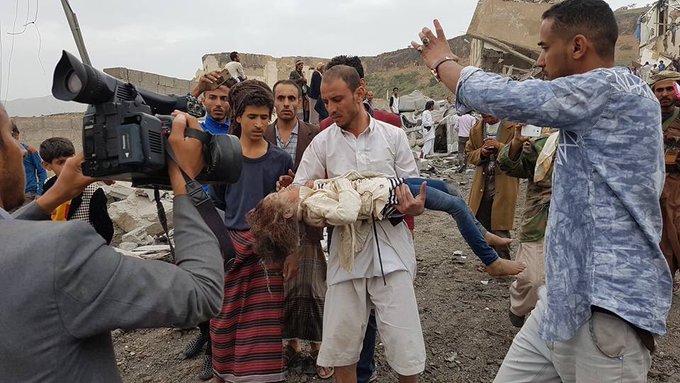
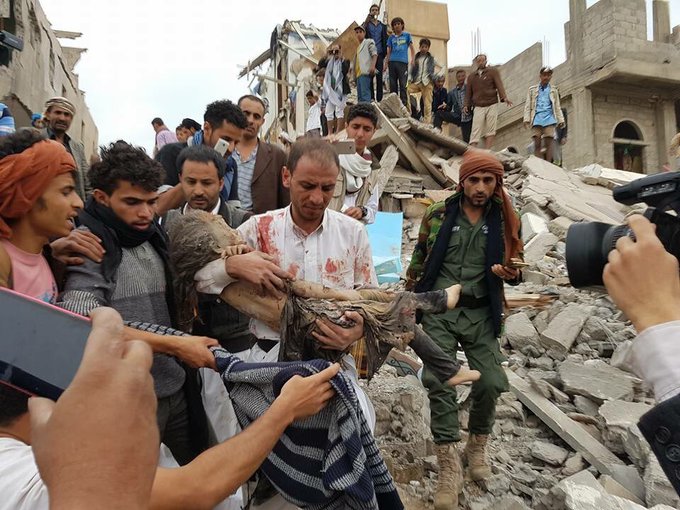
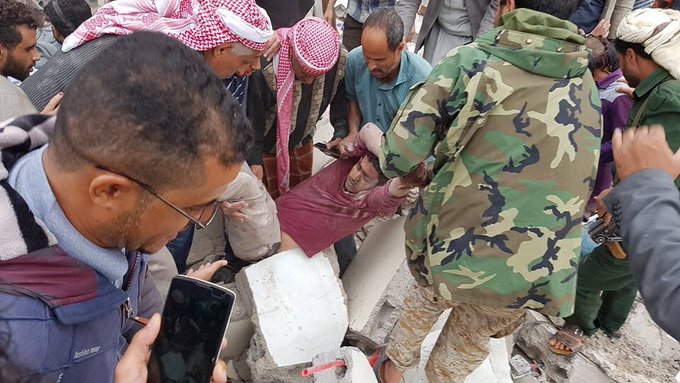
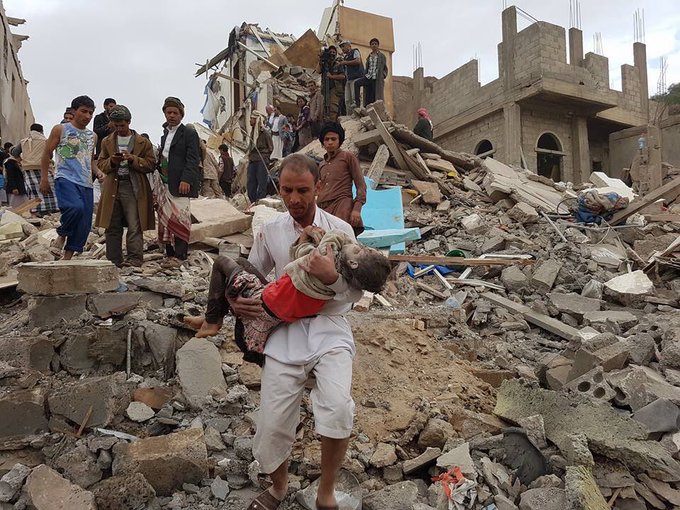
 UAE Ambassador to the US Yousef Otaiba (AFP)
UAE Ambassador to the US Yousef Otaiba (AFP)